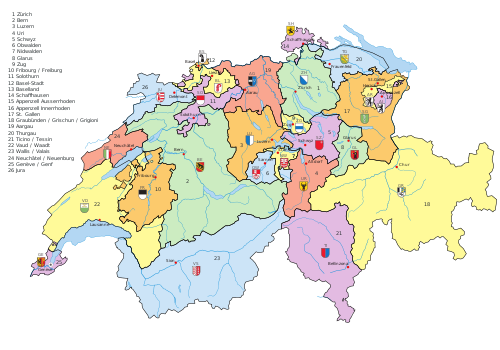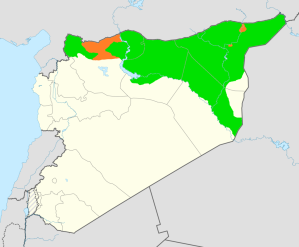By René Wadlow
The Association of World Citizens (AWC) has a longstanding interest in developing appropriate constitutional structures for States facing the possibilities of prolonged or intensified armed conflicts. An emphasis is placed on the possibilities of con-federation, autonomy, renewal, and trans-frontier cooperation. The AWC continues the con-federal, de-centralist, trans-frontier cooperation tradition of World Citizens Denis de Rougemont (1906-1985) and Alexandre Marc (1904-2000). (1)
In the recent past, this association has proposed con-federal structures to deal with conflict situations in Mali, Ukraine, Myanmar, Libya and Cyprus as well as Kurdistan, which involves both the structure of Iraq as well as positive cooperation among Kurds living in Iraq, Syria, Turkey and Iran. While the AWC does not sponsor the Kurdish demands as such, we believe that the Kurdish issues in Syria, Iraq and Turkey merit attention.
The current AWC emphasis is on the wider Middle East as this is an area where current armed conflicts may slip out of the control of conflict management techniques and institutions. The wider Middle East is an area of unrest, often without avenues for dialogue and compromise among the parties. Even in those States where there is no armed fighting such as Iran, Lebanon, Egypt, Israel-Palestine, there are strong tensions which can get worse and also spread. For the parties in these conflicts to seek a compromise, there needs to be a certain “atmosphere” – an informed public opinion that will accept the compromise and build better future relations based on an agreement. It is in the creation of such an atmosphere that citizens of the world have an important role to play. We see the dangers of calling into question of the nuclear agreement with Iran, especially by the United States (U. S.) administration.

In today’s world, only one nation-state claims to be a con-federation – Switzerland, officially the Swiss Confederation, a country of high political stability, harmonious ethnic and linguistic diversity, and a long-running tradition of informal diplomacy toward conflict resolution too.
As a nongovernmental organization (NGO), we can have little influence on who will be the “leaders” of these States, but we can play a role in proposing new con-federal constitutional structures linked to new attitudes, what I call ‘renewal’ within the existing social-ethnic-religious groups involved. New constitutional forms by themselves will not reduce the current antagonisms. However, if people now caught up in the ‘fog of conflict’ see that there may be possibilities for changes in the structures of government that will recognize their identity and views, doors may open for compromise.

Canada, the world’s second largest country, is organized as a confederation. The northernmost nation in the Americas stands out as a model of democracy, decentralized government, and coexistence between various ethnic and linguistic groups.
Con-federation and autonomy are broad concepts, capable of covering a multitude of visions extending from very limited local initiatives to complete control over everything other than foreign policy. Autonomy can therefore incorporate all situations between nearly total subordination to the center to nearly total independence. The ways in which the elements and patterns of autonomy are put together require political imagination, far-sighted political leadership, a willingness to compromise, and constant dialogue.
In none of the wider Middle East situations: Yemen, Syria, Iraq, Libya, on which we have made proposals have we found much of a climate for meaningful negotiations . Our “track record” outside the Middle East has not been much better: Sri Lanka, Burma, Mali, Sudan, and Ukraine. I think that from our contacts with diplomats at the United Nations (UN) in Geneva and New York, our proposals for new constitutional structures are not brushed off lightly, but they are not acted upon either. National political leaders often have a short attention span for issues unless there are strong domestic reasons for remaining involved. Diplomats often share this short-term point of view. “We are concerned with a ceasefire, with stopping the flow of Middle East refugees to Europe. After that, it is up to the people in each State to work out their constitutional structures. We thank you for sharing your ideas on the future of the Middle East. When the smoke clears, please come back to see us, but, of course, I may have retired by then.”

Rojava, a state-like entity formed by the Kurds of Syria, claims in its Constitution to be based on “democratic confederalism” and vows to be a part of a future “federal Syria”. Can that claim ever be realized, or is it bound to remain only wishful thinking?
Negotiations means a joint undertaking by disputants with the aim of settling their disputes on the basis of mutual compromise. Negotiation is a basic political decision-making process, a way of finding common interests, to facilitate compromise without loss of what each considers to be essential objectives.
The challenges posed by the conflicts in Mali, Ukraine, Myanmar, Libya, and Kurdistan need to be measured against the broad concept of security. Barry Buzan of the University of Copenhagen sets out four types of security:
1. Political security concerns the organizational stability of states, systems of government, and the ideologies that give them legitimacy.
2. Economic security concerns access to the resources, finances and markets necessary to sustain acceptable levels of welfare.
3. Societal security concerns the sustainability within acceptable conditions of the evolution of traditional patterns of language, culture, religions and customs.
4. Environmental security concerns the maintenance of the local and the planetary biosphere as the essential support system on which all other human enterprises depend.
One of the difficulties in each situation is what I would call “the frozen image of the other”. In each case, the group or groups demanding new State structures are seen in the minds of the current government authorities as being the same people with the same aspirations as when the demands were first made: the Karen of Myanmar today are the same as the Karen of the Union of Burma in 1947; the Tuareg of north Mali today are the same as those calling for the creation of an independent State in 1940 when the withdrawal of French troops to Dakar had left a political vacuum.
However, there have been evolutions in policy proposals and in the level of education and experience of new leadership of those demanding autonomy. Yet “frozen images” exist and need to be overcome within all decision-makers involved. The modification of “frozen images” is one of the tasks of non-governmental organizations and Track II diplomatic efforts. This is what I call “renewal”, the ability to think in new terms, so see things in a different way, to see the “Other” as part of the same humanity.
Notes
(1) See: Christian Roy, Alexandre Marc et la Jeune Europe : L’Ordre nouveau aux origines du personnalisme (Presse de l’Europe, 1998)
Jean-Louis Loubet del Bayle, Les non-conformistes des années 30 : Une tentative de renouvellement de la pensée politique francaise (Seuil, 1969)
Michel Winock, Esprit: Des intellectuels dans la cité, 1930-1950 (Seuil, 1996)
Denis de Rougemont, The Future Is Within Us (Pegamon Press, 1983)
Prof. René Wadlow is President of the Association of World Citizens.